DuckDuckGo, abbreviated as DDG, is an alternative search engine to Google. Unlike the latter, its particularity is the protection of privacy and the display of the same search results to Internet users for the same search term.
While most search engines collect some of your information and sometimes even use it to show you targeted results, the DuckDuckGo search engine seems to do it differently.
It is interested in the protection of Internet users’ browsing data and considers itself to be: “the search engine that does not follow you“.
Such a statement certainly raises many questions, but the most important are these:
- What is really meant by DuckDuckGo?
- How to search with this search engine?
- What are its characteristics ?
- How to optimize your site for this search engine?
In this new article, it will be a question of providing detailed to each of these questions.
So follow!
Chapter 1: What is DuckDuckGo?
In this first chapter, I introduce you to the DuckDuckGo search engine through:
- Its history;
- His evolution ;
- Its difference with other search engines;
- And its benefits.
1.1. History of DuckDuckGo
Name inspired by the game Duck, Duck, Goose, the search engine Duckduckgo (DDG) was created in February 2008 by entrepreneur Gabriel Weinberg. Its headquarters are based in Paoli, Pennsylvania, United States.
Unlike most search engines you have encountered so far, the idea behind the creation of the DuckDuckGo search engine is not just to allow people to search and find results online.

Its creation stems from an ambition: that of proving that it is possible to protect the privacy of Internet users.
Therefore, it prevents Internet users from being tracked while browsing the Net.
Likewise, it does not offer personalized search filters, nor does it install plug-ins or cookies on Internet users’ browsers whose purpose would be to monitor their online activity or establish their profile.

All this explains the reason why the search engine displays the same results for any query formulated to all Internet users regardless of their:
- Position;
- Or search habit.
The DuckDuckGo site was designed using three programming languages.
It is:
- Perl: This is a programming language that allows easy processing of textual type information. It uses the basics of control and printing of the C language, but also scripting languages.
- JavaScript: JavaScript is an object-oriented programming language. It is often used as a scripting language for web pages.
- Python: Python is defined as an “interpreted” programming language. It is both open source, cross-platform, and cross-paradigm.
Since its inception, the DuckDuckGo engine has evolved and expanded to other platforms.
The project has expanded to the following platforms:
- Nginx;
- FreeBSD;
- Torproject ;
- Etc.
Regarding its business model, it should be said that it earns money thanks to:
- Its partnership with eBay and Amazon;
- advertising platformsYahoo, Microsoft and Bing ;
- To affiliate marketing.
According to Duckduckgo founder Gabriel Weinberg, the company’s revenue exceeded $1 million in 2015. The latest reported revenue is around $25 million.
1.2. The evolution of the DuckDuckGo search engine
From 2008 to date, the DuckDuckGo search engine has not remained the same. It has seen improvements.
The following events undoubtedly show how much the search engine has evolved over the years:
- During the month of December 2008, the DuckDuckGo search engine was exposed to the “TechCrunch Elevator Pitch”. Also in the same year, it was also a finalist in the “BOSS Mashable Challenge”;
- In 2010, more precisely during the month of July, the founder Gabriel Weinberg created a community space around DuckDuckGo. The objective is to allow the public to report the problems they encounter, to discuss ways to promote the search engine, but also to discuss its characteristics and suggest innovations;
- Also during 2010, the DuckDuckGo search engine is setting up a Tor release enclave. This should now allow it to ensure the anonymity of end-to-end users during their navigation;
- In 2014, the design of the search engine was revamped to embrace a new appearance which now incorporates features such as: Images, local search, auto-suggest, weather, recipes, etc. ;
- On September 17, 2014, the DuckDuckGo search engine is included for the first time in the Safari search engine. A few days, November 10, it will be Mozilla Firefox’s turn;
- In 2015, the search engine exceeded 10 million searches per day;
- On May 30, 2016, DuckDuckGo becomes tor browser’s premier search engine. Added to this is the advent of other features such as: filtering results by date;
- In March 2019, Google added it to the list of default search engines in its browser;
- Also in 2019, DuckDuckGo reached the 1 billion search mark per month for the first time in its history;
- In 2021, it crosses the milestone of 100,000,000 searches per day.
For more details on the evolution of the DuckDuckGo search engine during these 13 years of existence, I suggest you visit the page about the DuckDuckGo site.
1.3. Some differences between DuckDuckGo and other search engines?
The DuckDuckGo search engine can be differentiated from Google and other search engines for several reasons:
1.3.1. DDC does not use the browsing data of its users
It is a question here of protection of internet user browsing data.
This protection is observed first of all by the fact that DuckDuckGo does not save the IP address of users who visit its interface.
Secondly, this protection is manifested by the non-collection of users’ personal information, but only that which is related to the keywords used for the search.
Additionally, instead of filtering results and personalizing them based on user history, as happens with Google, DuckDuckGo deliberately displays the same search results to all Internet users when they use the same keyword- key.
- On google the results are generally displayed according to your position and other factors

- This distinction is not observed on DuckDuckGo
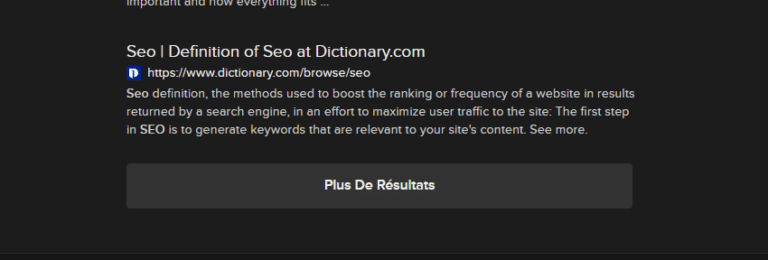
So, unless they use the filter settings, everyone sees the same search result. The consequence is that the results displayed are not always relevant.
But, privacy protection does not fail.
Also remember that DuckDuckGo does not accept the sharing of data on users’ keywords with the websites they visit as a result of a search.
Regarding cookies, note that they are only used when necessary.
Always, with a view to ensuring the security of visitors, DuckDuckGo attaches great importance to websites encrypted in HTTPS rather than their unencrypted versions.
1.3.2. DDC does not have a personal index
The second reason that consecrates the difference between DuckDuckGo and other search engines is linked to the existence or not of an index from which the results are drawn.
In fact, when it comes to the display of search results, it should be noted that unlike other search engines which have their own index, the search results data comes from a compilation of more than 400 sources. .
Among these sources, you have:
- Bing;
- Wolfram Alpha;
- Wikipedia ;
- Yahoo;
- Etc.
1.3.3. DuckDuckGo is open source
Finally, the third reason that justifies the differences between DuckDuckGo and other search engines is related to the fact that DuckDuckGo is essentially based on open source technologies and projects.
This gives Internet users the possibility of modifying or adding certain elements themselves.
This is what we observe for example with instant responses.
1.4. Why is DuckDuckGo interesting?
Despite the fact that the DuckDuckGo search engine ranks lower in the world ranking of the best search engines of all time, it looks interesting for several reasons. Among them, I can cite:
1.4.1. Infinite scrolling in search results
On DuckDuckGo, you have the option of infinite scrolling in search results. That is, search results can be displayed on a single page.

fact, when you do a search, the search results load on the same page one after the other.
You no longer need to load a new page to access the rest of the results.
1.4.2. The privacy
policy The privacy policy of the DuckDuckGo search engine is summarized in these terms:
“We do not collect or share personal information”

Indeed, unlike other search engines like Google, DuckDuckGo does not collect or store any personal user information.
For this, it prevents:
- Possible search leaks that may occur when browsing online;
- Sharing your search terms with the search engine and the sites you visit, as well as your IP address;
- It redirects and modifies the links you visit in such a way that the sites you land on do not know the queries you entered;
- It also turns your GET requests into POST requests. This has the consequence of not displaying your request in the browser you are using, which prevents their escape.
DuckDuckGo also prevents your search history from being saved. Indeed, the search history includes elements such as:
- The IP address;
- The User Agent;
- The unique identifier;
- Your account information.
This information can help piece together all of your online activity and allow search engines to learn a lot about you. DuckDuckGo is against saving this information because of the uses that can be made of it.
Finally, although it seems difficult, DuckDuckGo does not collect information from your web browser.
1.4.3. The existence of a community space for exchanging
Alongside the DuckDuckGo search engine, Gabriel Weinberg had the idea of creating a communication platform which should make it possible to collect suggestions for improving the search engine
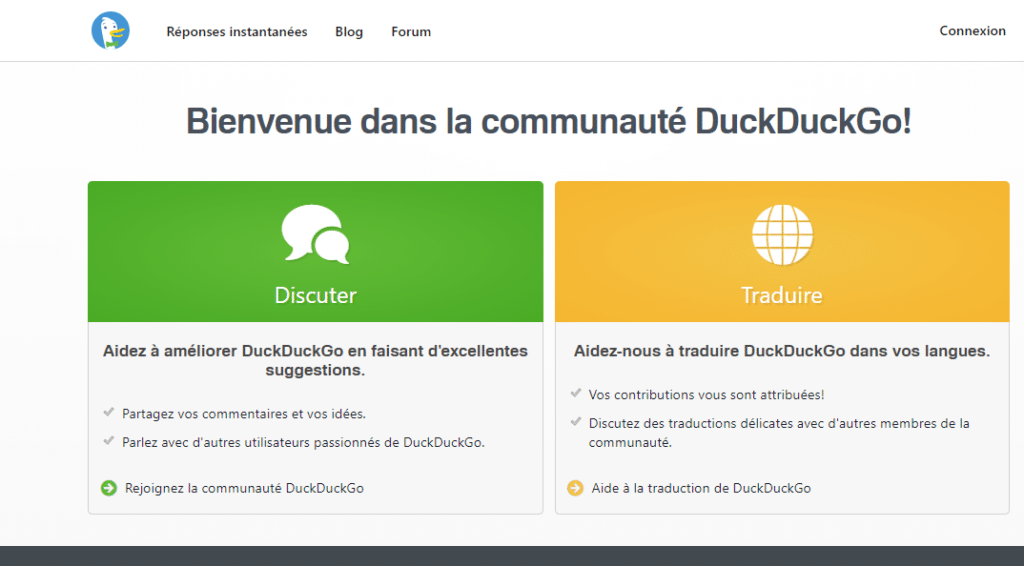
It will actually be for users to submit their ideas, but also to exchange with other users of the search engine.
Beyond this aspect, note that through this space, users also have the opportunity to become DuckDuckGo contributors by helping to translate the search engine into their language.
Now that you have an idea of what the DuckDuckGo search engine represents, I suggest that you discover in the following lines how to use it.
Chapter 2: How to search with DuckDuckGo?
In this chapter, I explain to you how to use the DuckDuckGo search engine, but first, it is necessary to say a word about how to access it as well as about the different search operators that can be found on DuckDuckGo.
2.1. How do I access the DuckDuckGo (DDG) search engine?
Access to the DuckDuckGo search engine is done differently depending on whether you are using a mobile or a computer.
If you are using a mobile, you can access the search engine in two ways:
- Go to the search engine site through one of your mobile browsers (Chrome, Opera, Phoenix, etc.);
- Download DDG browser from play store (if running on android system) or apple store (when running on iOS system).
When using a computer, access to duckduckgo may only be possible from other browsers, as DDG does not yet have a computer browser. To use it, just go to: https://duckduckgo.com/

Nevertheless, you can set it as your default search engine or add it as an extension in your browser.
2.1.1. Add DuckDuckGo to Chrome
If you use the Chrome browser, you can add duckduckgo as your default search engine.
To do this, you need to:
- Go to Settings;
- Search and press Search Engine
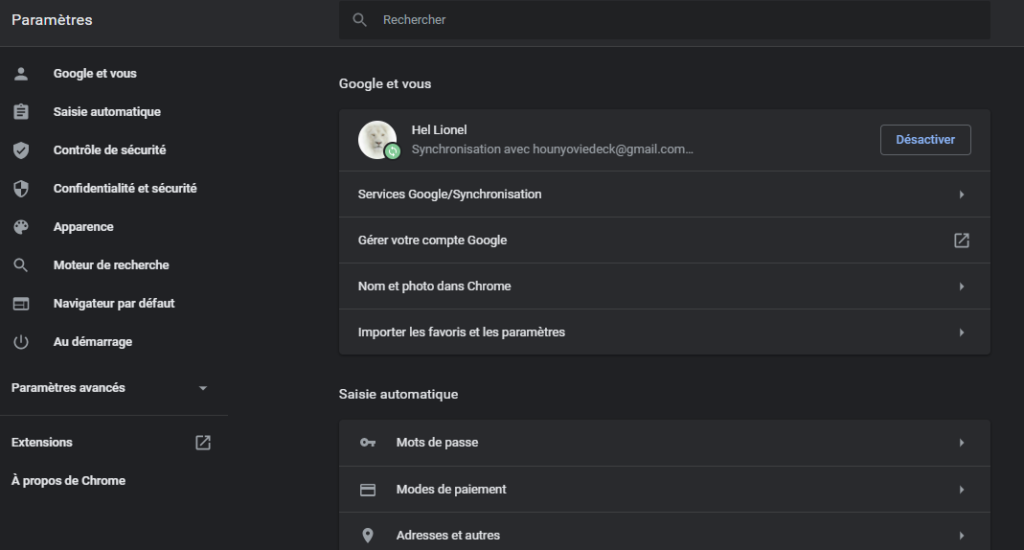
- Then select the search engine.
- Tap the vertical dots next to DuckDuckGo and choose “Use Default”.

As you will see, these different steps will make DuckDuckGo the default search engine that shows up in your search bar every time you open the Chrome browser.
The second option to have the search engine built into your chrome browser is to add it as an extension.
To do this, all you have to do is:
- Go to the extensions Google chrome
and add duckduckgo extension.
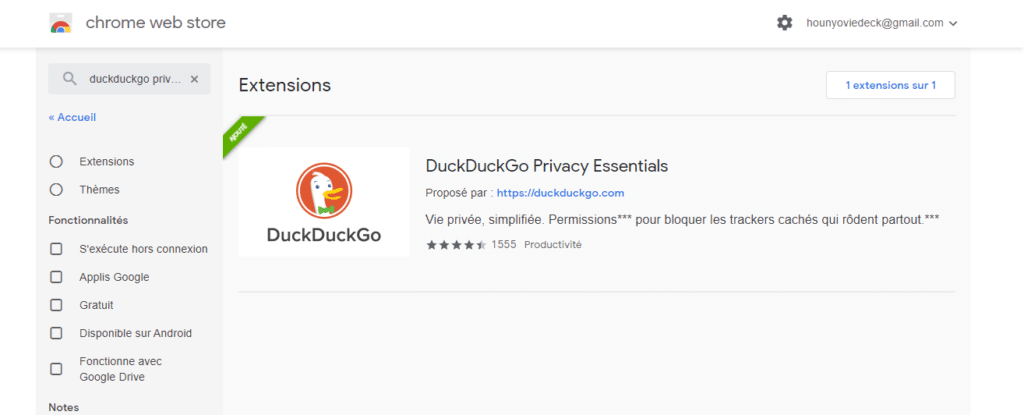
2.1.2. Add DuckDuckGo to Firefox browsers
With Firefox, you have the option of making duckduckgo your default search engine. You can also add it as an extension.
To make DuckDuckGo your default search engine in Firefox, here are the steps to follow:
- Go to the options by clicking on the three horizontal lines at the far right of your address bar;
- Click on search and go to the level of “search engine”;
- Click on the drop-down menu that appears;
- Search for DuckDuckGo and set it as the Default search engine.
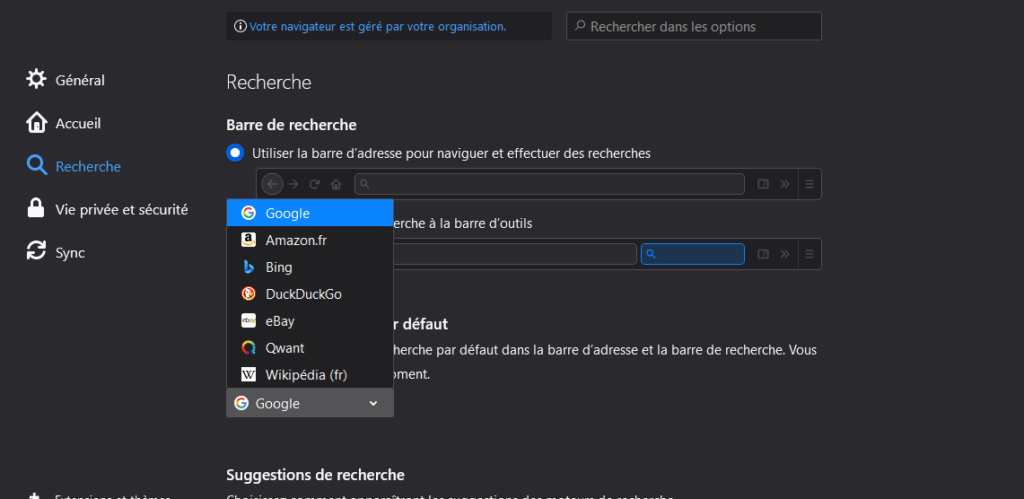
As you will see, this manipulation will modify the search parameters at the level of the address bar of the Firefox browser.
In the same way that you can add DuckDuckGo as an extension in Chrome, this is also possible in Firefox.
In the add-ons library, you will find the add-on called DuckDuckGo Privacy Essentials which has additional privacy features.
To add it:
- Go to the Firefox extensions site;
- Find the duckduckgo module and add it.
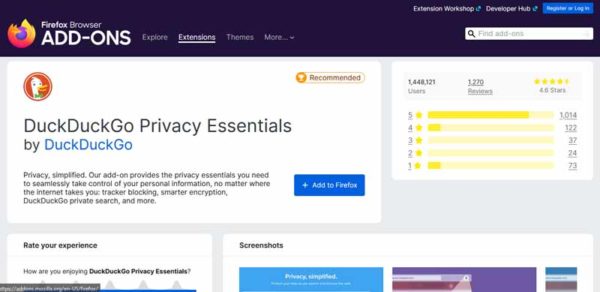
Apart from chrome and Firefox, you can also add Duckduckgo to other browsers like:
2.1.3. Add DuckDuckGo to Safari
On safari, all you have to do is simply press the magnifying glass in the search bar.
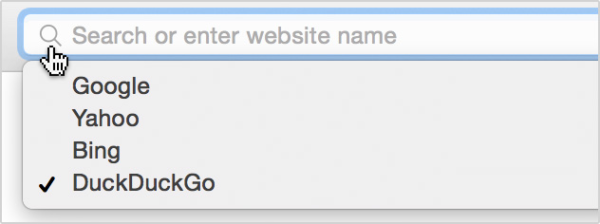
This will bring up a drop-down list.
From this list, select the default DuckDuckGo search engine, you can also add the DuckDuckGo extension from the App Store.
2.1.4. Add DuckDuckGo to the Brave browser
With the Brave browser:
- Open the hamburger menu at the top right and go to Settings;
- Select Search engine then open the drop-down menu at the top of the page;
- Select DuckDuckGo by default.
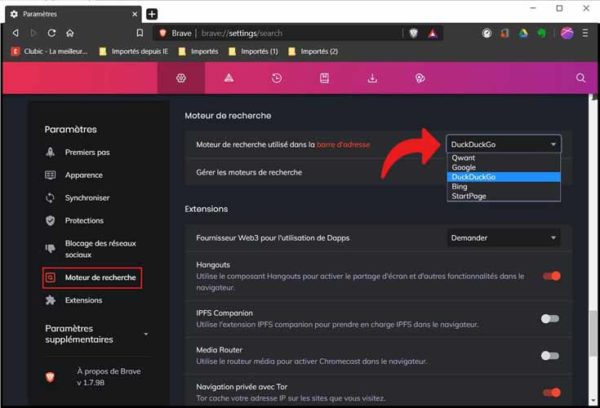
2.1.5. Add DuckDuckGo to the Edge browser
If you want to add the Duckduckgo search engine from the Edge browser, here’s how:
- Go to the browser settings by clicking on the three horizontal lines that appear at the top left;
- Click on privacy, research and services;
- Scroll down the page;
- Search for “Services” and click on “Address bar/Manage search engines”;
- Choose the DuckDuckGo search engine from the list of search engines that appears and set the default
- . If it is not present in the list, press add and fill in the fields with the name and url of DuckDuckGo.
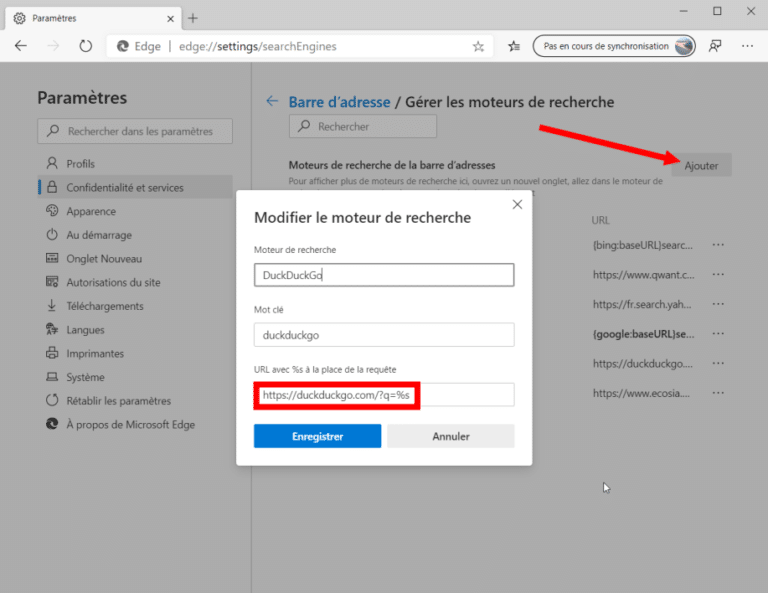
Here too, you can also get the Privacy Essentials add.
2.2. DuckDuckGo search
engine search operators With the DuckDuckGo search engine, the following search operators can be used to refine your searches:
To carry out safe searches, simply add “!safeon” or “!safeon” respectively at the end of your query.
To get the latest news about a topic, adding the phrase “news” to the end of your query is helpful. Similarly, if you want to display pages whose title includes the terms of your query, you must use the syntax: intitle: “term of your query”.
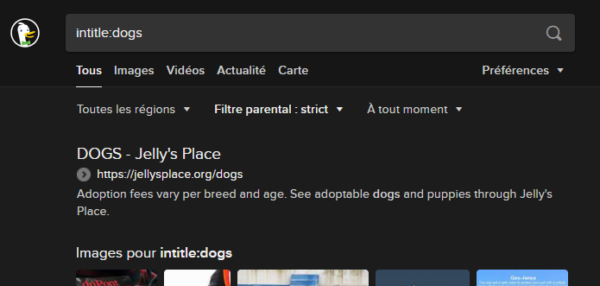
Adding the word “maps” to the end of a location generates response map results for that location.

To have files concerning a request, you can use the following syntax: Request filetype: type of file desired (supported files are: PDF, doc, xls, PPT, html).
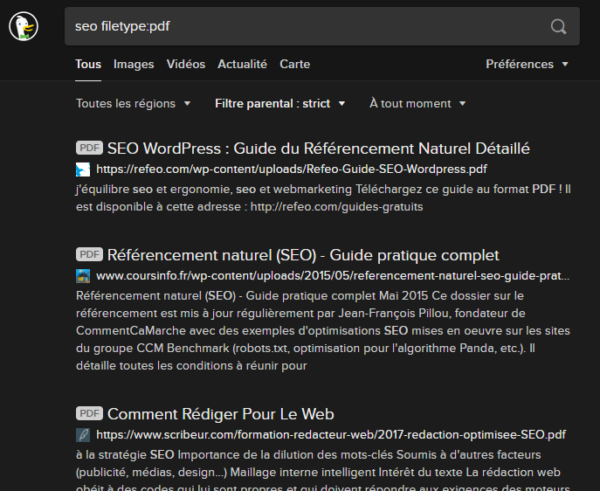
When you add the word recipes to your search, the DuckDuckGo engine will show you recipe search results. These results are powered by the Yummly.

You can discover other operators by visiting the help page DuckDuckGo
2.3. How to take advantage of the DuckDuckGo search engine?
The DuckDuckGo search engine is not that far from the other search engines you have used so far when it comes to exploiting it.
In fact, like any other search engine, to use it, all you have to do is:
- Access its interface;
- Type your query in the search bar;
- And launch the query by pressing the magnifying glass icon or search.
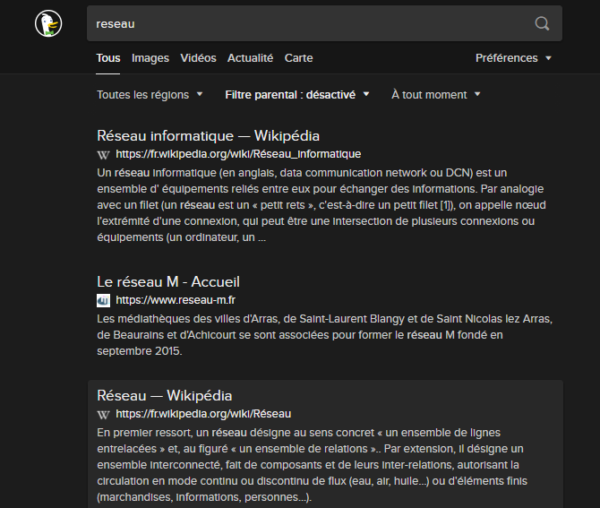
Once these various manipulations have been carried out, all you have to do is wait for the actual results to be displayed while hoping to find what you are looking for.
Even though the display of search results appears to be similar to what you see on Google, there are some differences.
As for the similarities, you have:
- The ability to narrow your search results to images, videos, news, maps, shopping, or consider all of its elements;
- You will also find related searches and the knowledge panel that appears for certain searches.
Regarding the differences, you observe:
More features on the Google search engine than on DuckDuckGo. To realize this, just look at what is displayed when the term “SEO” is searched at the level of each search engine.
On Google, you have:
- The urls of the sites dealing with your request;
- The knowledge panel;
- Other questions asked;
- Related research;
- Etc.

While DuckDuckGo usually displays:
- The urls corresponding to your request;
- The knowledge panel;
- And the associated results

Also, note that Google taking your location into account returns results that may be more relevant than the results you’ll get on DuckDuckGo.
In addition, it should be remembered that the DuckDuckGo search engine uses Apple Maps and Yelp reviews, unlike Google, which uses Google Maps and Google reviews. Bing works with OpenStreetMaps and TripAdvisor.
Now that you know the history, the difference between DuckDuckGo and other search engines and how to search, I invite you to discover the features of the DuckDuckGo search engine.
Chapter 3: What are the features of DuckDuckGo?
You will find in this section the characteristics of the DuckDuckGo search engine.
3.1. What are the main features of DuckDuckGo?
As I have already mentioned, the Duckduckgo search engine is a particular type of internet search engine. Its mission is to protect the privacy of Internet users.
Among its many particularities, you have:
3.1.1. Instant Answers
Apart from the search results that come from its index, the Duckduckgo search engine displays instant answers.
They are designed using static data sources such as text files.
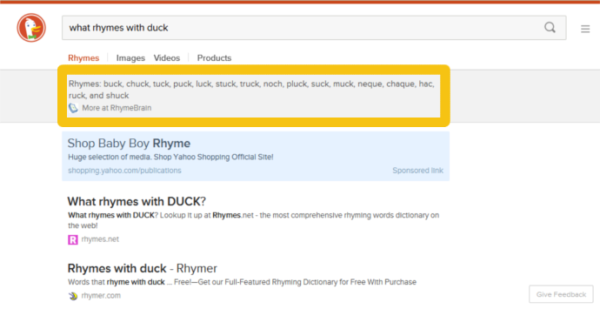
Instant responses are also known as zero click info.
Their raison d’être is to offer users what they are already looking for on the search results pages.
This saves them from necessarily clicking on a link before finding what they are looking for.
DuckDuckGo instant answers are based on over 100 sources.
Today there are almost 1235 active instant replies.
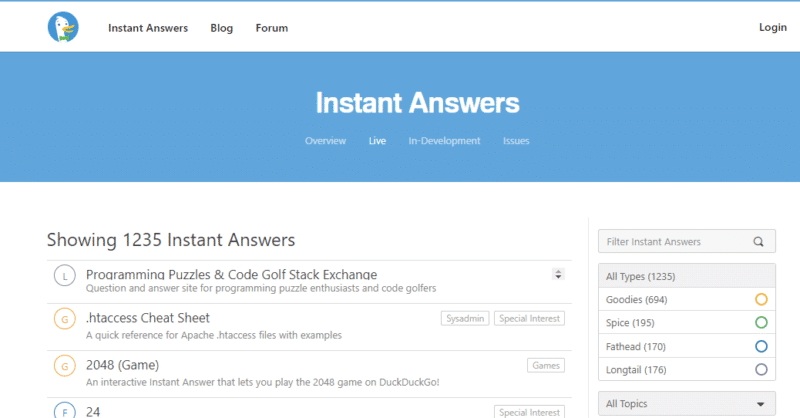
Instant Responses are curated at DuckDuckGo, they are open source, and anyone can build or work on these Instant Responses.
3.1.2. The Bangs
Apart instant answers, the search engine DuckDuckGo has implemented “bangs”.
Bangs or fringes in French are shortcuts that aim to quickly bring you to search results available on other sites.
For example, when you are at the DuckDuckGo search engine and you want to search on the Google search engine, you can access it directly.
Just type in the search bar!G.To discover the different Bangs or possible shortcuts, you just have to type in the search bar the sign “! ”.
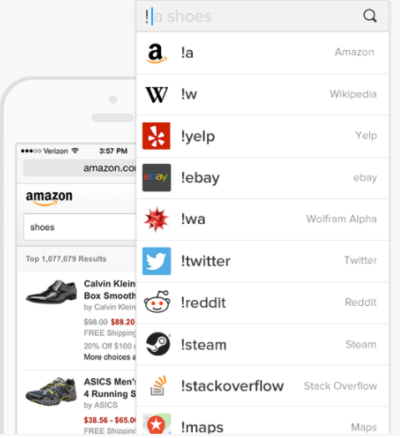
Currently, the search engine has about 13564 bangs.
3.1.3. Related searches
Each time you perform a search, the DuckDuckGo search engine displays certain search terms that are related to your query, in addition to the search results.

Another feature of the DuckDuckGo search engine is the ability it gives you to:
- Display your results by region: unlike a search engine like Google which tracks you and displays search results based on your location, the DuckDuckGo search engine instead offers you the possibility of displaying your results yourself by region;
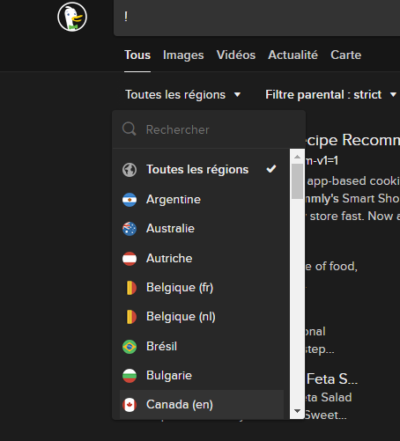
- A parental filter that allows you to authorize or not the display of sensitive content in your results;
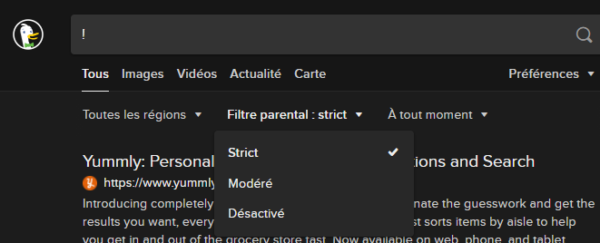
- You also have a third filter that allows you to display your results at a given time. According to this filter you can display the results for the past year, for the past week, etc.
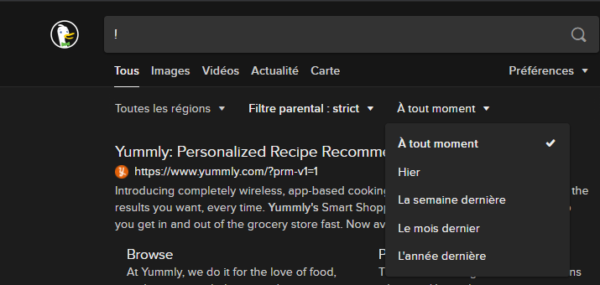
Let’s also not forget that the search results can be restricted to either:
- Images;
- To videos;
- On the news;
- A la carte;
- To all of these options at once.
When you choose to narrow your results to one of the options, you also have a set of filters displayed.
You can thus display the images by choosing:
- Their sizes;
- The colour ;
- The type of image;
- The layout of the image;
- The license type of the image.

Videos can be displayed according to:
- Their resolution;
- Duration;
- Or the license.

For searches related to the map, remember that it works from apple maps.
Like Google’s My Business, Apple also offers marketers the ability to manage their physical business’s online presence through a portal called “Small Business”.
In addition, customization of the DuckDuckGo search engine is also possible. This is done from the “preferences” tab.
One of the most interesting possibilities is at the level of confidentiality or you can modify the parameters in order to choose yourself the confidentiality parameters which will apply to you.
For example, you can choose whether your requests should be sent using the GET or POST method or whether your clicks should be redirected to the DuckDuckGo server.
These different manipulations allow you to prevent leaks.
3.1.4. Access to social networks
The DuckDuckGo search engine offers you on its interface the possibility of following it at the level of social networks such as:
You also have the option of accessing its blog or subscribe to the newsletter.

These two channels serve as means of communication to raise awareness and provide Internet users with all the useful and necessary information that will allow them to protect their privacy online.
3.1.5. Auto-suggest
With DuckDuckGo’s search bar, you also have access to auto-complete.
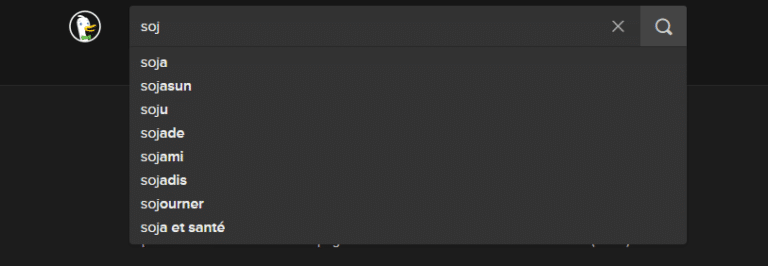
This allows you to get suggested words when you type a query into the search bar.
Search results are displayed with each site’s favicon.
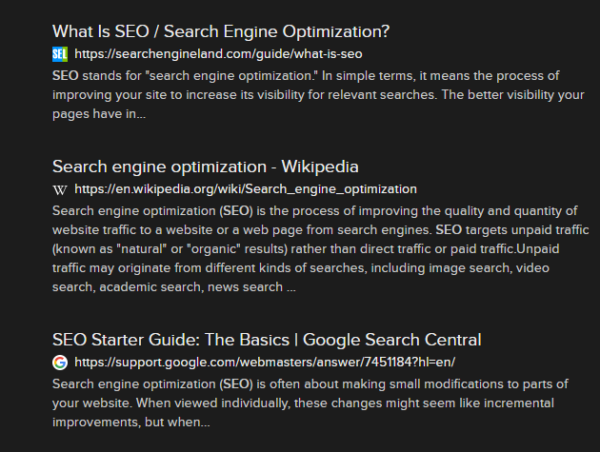
3.1.6. Category Pages
When using the DuckDuckGo search engine, you can display a category page for certain searches.
With such a page displayed, you have the ability to expand multiple category entries by clicking on a letter at the top of that category to jump to the corresponding section.
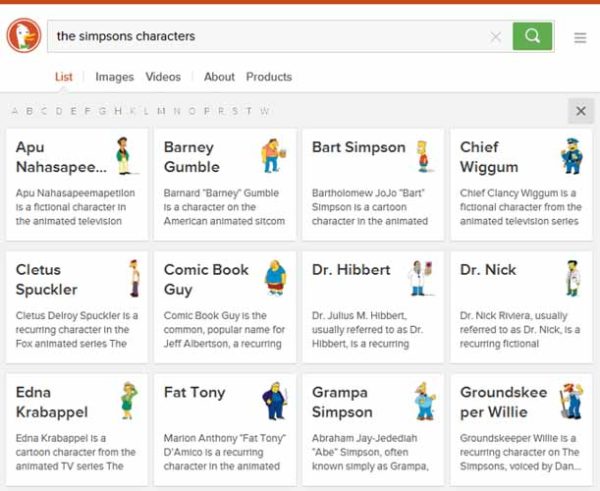
Another feature of the duckduckgo search engine is the ability it offers you to browse search results using keyboard keys.
Apart from these things which you can easily observe at the search engine level, there are various other features which require you to enter a query in the search bar of the DuckDuckGo search engine to access.
3.2. Some features of the DuckDuckGo search engine
Here is a non-exhaustive list of some features that you can observe on the DuckDuckGo search engine. They appear as instant responses.
3.2.1. Stopwatch
With DuckDuckGo, you can display a stopwatch.
To use this stopwatch function, you simply need to search for the word: “stopwatch” in the search engine.
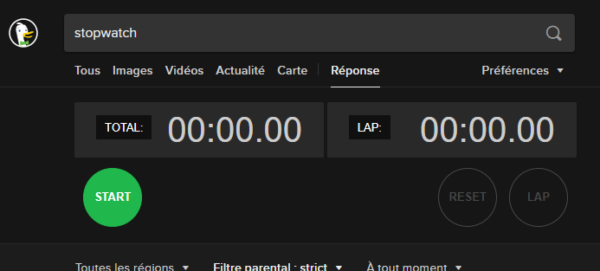
3.2.2. Generating passwords
The Duckduckgo search engine also allows you to create a strong password.
To do this, you will also need to type in the “Password”.

When you want to have a strong password, you just need to add a high number. This will allow you to have a password with the same number of characters.

There is no restriction on the size of the password. So you have the freedom to create a password of any size, it depends on your needs.
Another way to create your password with the DuckDuckGO search engine is to type in the search bar: “random passphrase“.
Using this feature, you can create a password like:

This password then consists of four common words that are easy to remember, but difficult to crack.
3.2.3. Put in uppercase or lowercase
When you have just typed a phrase or a word in the search engine and you want to put it in uppercase or lowercase, you can simply precede the word or phrase changed:
- “Uppercase:” to convert lowercase to uppercase;

- lowercase: to transform the sentence or the word written in upper case into lower case.

3.2.4. Find words that rhyme
Duckduckgo has an instant answer that lets you find words that rhyme. To verify this, you must type the following query: Rhymes with + word choose.
For example if I want to find the words that rhyme with SEO, I have to type: rhymes with SEO
Once done, my instant response with said words will show up:

3.2.5. Check if the website you want to visit has problems
If you’ve been trying to access a site for a while and it doesn’t work, the DuckDuckGo search engine gives you the possibility to know if it is down or nope.
To view the website, you just need to type the following syntax “is (site name) down“.For example if it is Wikipedia you must type: is wikipedia down.

3.2.6. Calendar
The Duckduckgo search engine can display the date and time if you wish.
But by promoting the calendar as an immediate response, the Duckduckgo goes one step further. To view the current date, simply enter the term “Calendar” into Duckduckgo’s search bar. After that, you will see today’s date.

If you decide to consult a date other than today’s, you can always use the same function to consult the calendar for any month and year.
To do this, just type the following syntax: calendar followed by the month and year you want to go to.

3.2.7. Loan Calculator Loan
Calculator is another useful instant answer from the Duckduckgo search engine.
Using the DDG Loan Calculator, you can check your monthly payments and calculate the total amount of interest payable.
As with the terms and conditions of various loan agreements, the search query we used for this is a bit difficult to remember.
The query used for this is the following syntax: “Loan AMOUNT at Interest with PERCENT down for DURATION”.

3.2.8. Shortening and expanding links
DuckDuckGo also lets you find sites that are hiding behind shortened urls.
Therefore, if you want to see the websites that hide behind these links, you just have to use the syntax: expand http: “the shortened URL”.
But when you want to shorten a URL, you can use the following syntax: “shorten” before the URL.
3.2.9. Other Great Features for Developers
The Duckduckgo provides various features for software developers. The features provided by the Duckduckgo for the software developer include:
- Display colors based on the hexadecimal valuee ;
- Convert binary to decimal;
- Generate ipsum lorem text;
- Show HTML value for any special character;
- Encode URLs into machine-readable text;
- Display the list of special characters and their HTML values;
- Play certain Games;
- Search for products available on Amazon;
- Etc.
You’ll find the other types of DuckDuckGo search engine instant responses and how to view them by going to the Instant Response Index DuckDuckGo
However, you yourself have the possibility to add instant answers to the search engine, for that you must:
- Go to the index of instant answers;
- Select create an instant response;
- Fill in the various fields presented to you.
Now that you have a broad idea about the DuckDuckGo search engine, one question remains. It is that of referencing at the level of this search engine.
Chapter 4: How to optimize your site for the DuckDuckGo search engine?
Here, I explain to you what it is about SEO at the level of the DuckDuckGo search engine.
Asyou know, SEO is the optimization of a site for search engines. In other words, it’s all that you do to ensure that your website is well positioned at the level of a search engine.
The first question therefore arises as to how to rank your site in the first search results of this engine. Before answering this question, let’s first see why it’s worth appearing in DuckDuckGo’s search results.
4.1. Why bother with SEO with DuckDuckGo?
The answer to this question can be found in the statistics collected about the operation of the DuckDuckGo search engine.
Although it only has a small global market share with 0.61%, the DuckDuckGo search engine receives daily traffic of around 100,000,000. This proves that it attracts users.
Webmasters must therefore take it into account insofar as it can allow them to have more traffic to their website.
Likewise, by prioritizing the protection of users’ private information and publishing enough articles on the issue, DuckDuckGo browser seems to arouse users’ interest.
This assumes that the implementation of a strategy could be useful for some companies.
Anyway, when you decide to adopt an SEO strategy on DuckDuckGo, you must keep in mind that it does not work the same way as the search engines on which you are used to. reference namely:
- Google;
- Bing;
- Etc.
The particularity is here in the fact that it works in a different way.
4.2. How are search results displayed on DuckDuckGo?
There is not enough information on how the DuckDuckGo search engine works. Especially on the way it indexes and ranks websites.
However, the research carried out did allow us to discover some aspects of its operation.
DuckDuckGo claims to use over 400 different data sources to deliver results to queries made to it.
This of course includes other search engines namely:
- Yahoo;
- Bing;
- Google ;
- And others.
This is an aspect that already distances it from Bing or Google, which have their own indexes. They also do their own ranking using the robot explorers they have.
DuckDuckGo’s index is a combination of static results from hundreds of other sources displaying results known as instant results.
The consequence of this situation is that those who optimize their site for the Google and Bing search engines no longer need to optimize their site for the DuckDuckGo search engine.
4.3. Some tips to optimize your site for DuckDuckGo as well as for other search engines
SEO strategies at DuckDuckGo could therefore be what we observe at the level of other search engines.
Thus, you can rely on the same strategies used to optimize your site at Google or Bing.
From there, it appears that to optimize your site at the level of DuckDuckGo, you must respect the best SEO practices as they are enacted at the level of the other platforms.
If your site is referenced for example on Google, you simply have to respect the rules of Google.
That is:
- Set up your site with a sitemap and crawler meta-commands to help search engines understand and crawl your site structure;
- Do not block the necessary resources allowing the understanding of the pages which are at the level of the websites. Avoid the same with regard to resources whose absence could prevent providing an adequate user experience;
- Submit URLs or sitemaps to Google directly through Google Search Console.
If you want to have a good knowledge of SEO and its practices, I suggest you consult my SEO guide for beginners. In this ebook you will find all the information you need to implement a winning SEO strategy on your website.
Additionally, make sure that:
- Site development is done appropriately;
- That there is mobile friendliness;
- The JavaScript is well rendered.
Implementing site load metrics can also improve your site’s crawling along with your SEO performance in both Google and DuckDuckGo.
Remember, however, that the latter has its own “DuckDuckBot” bot, but this index bot is not used for crawling and adding pages to its index.
It basically improves the index by finding and removing spam URLs and low quality content.
In reality, as you know, the keywords of SEO are:
The strategy to be put in place must therefore in no way omit these different aspects.
More concretely, you can follow the following advice:
4.3.1. Design a quality website with a good user experience
Based on the objective of the search engine, you must first of all ensure that your site is not only of quality, but also of trust.
The quality of your site must ensure a good user experience, that is to say:
- Promote a faster loading time;
- Integrated intuitive design;
- Allow users to navigate smoothly, regardless of the device they use.
4.3.2. Attract quality backlinks to your site
Whether it’s Google or Bing, backlinks are one of the most important ranking signals when it comes to SEO.
So if you want to get involved in marketing with DuckDuckGo, you should keep this in mind.
The search engine does not omit this and it is for this reason that it declares: “the best way to obtain good rankings is to obtain links from high quality sites”.
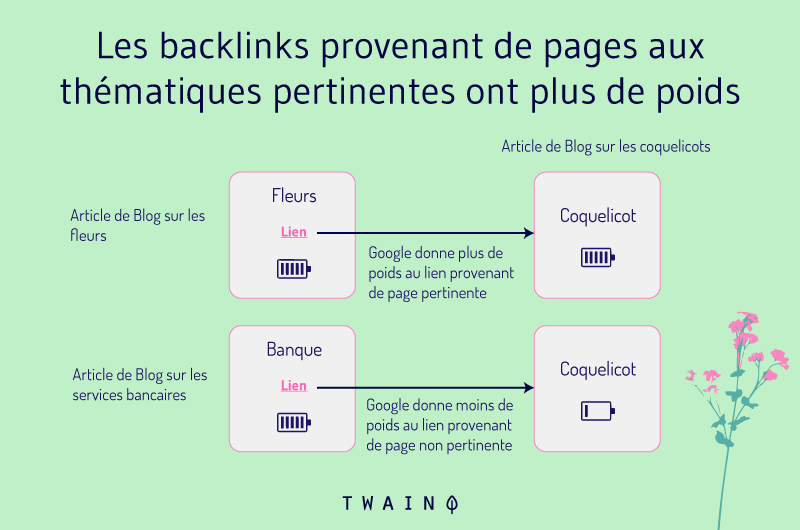
should also know that backlinks can only be obtained naturally.
You risk being penalized by Google and other search engines for a bad backlink profile if, for example, you adopt the following practices:
- Buying backlinks;
- Implementation of Black hat SEO tactics ;
- Creation of poor quality links.
This will undoubtedly contribute to harming your ranking.
But you can use the following methods to try and gain legitimate backlinks:
- Start by creating and optimizing high-quality content. This content must be honest and unique, but above all be designed to satisfy visitors.
- Proceed to Full SEO on the page. This should help the search engine improve the ranking of your content in the results pages. Creating content can act both positively and negatively. Indeed, if your content is of good quality, it will positively influence your SEO and you will rank well. But if you create low quality content, you will have the opposite result.
- Increase your content shares by using other strategies, such as setting up social media sharing buttons.
Still with regard to backlinks, you are aware that their number plays a very important role for ranking in search engines.
It is therefore necessary to try to have as many as possible and to favor those which are of high quality
. 4.3.3. Optimize keywords
Like Google, DuckDuckGo also understands the context and semantics of the keywords you use.
This will therefore mean that strategies concerning semantic search and understanding the keyword must be taken into account to optimize your site on DuckDuckGo.
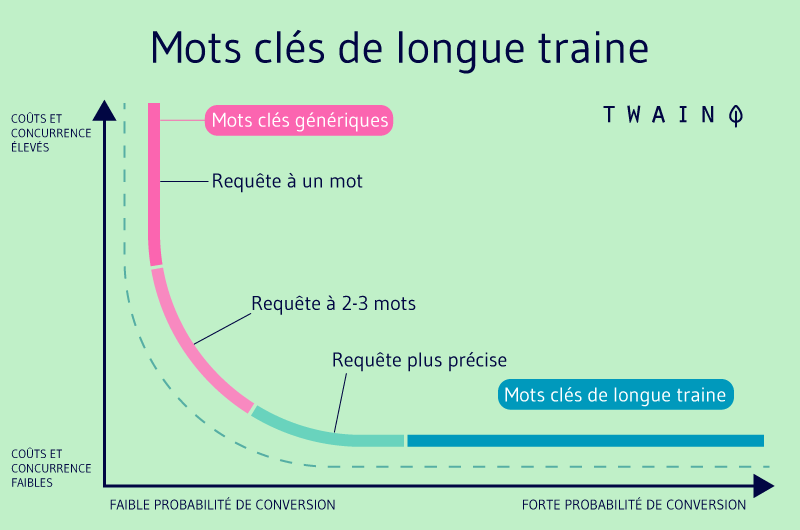
Indeed, as you know, at the beginning of the internet, search engines search displayed results based solely on the search for correspondence between the pages and the request of the Internet user.
Now they are sophisticated enough. They understand what people are asking for.
They also include:
- Closely related words;
- Synonyms.
This must also be taken into account when setting up a strategy for marketing and referencing your site on DuckDuckGo.
To learn more about keyword research and optimization, I suggest you read the Complete Guide to Keyword Research.
4.3.4. Optimize Metadata
Businesses should also follow best practices from Google and Bing for optimizing metadata on their site.
Metadata is one of the most common SEO practices. They are necessary as they are used by search algorithms to understand the content of a web page as well as to identify the keywords on which that page should rank.

Metadata optimization for SEO at DuckDuckGo should be no different from the strategy that you use at Google or Bing.
The following article gives you more details about metadata.
In addition to the optimization of metadata, it is also necessary to take into account:
4.3.4.1. Optimizing your title
search tags Title tags results page in Google, Bing, Yahoo and of course on DuckDuckGo as well.

There is no one right or wrong way to write title tags , but some methods have become the norm. Write your title tags naturally, include your target keywords, include your branding, and keep it under around 60 characters.
4.3.4.2. Optimizing your meta descriptions
The meta description appears just below the title in search results.
Meta descriptions are not used as a ranking factor by major search engines, including DuckDuckGo.

These are just descriptions used to inform human readers of your page. A common SEO strategy is also to include keywords here in order to increase click-through rate, but the only major rule is to keep meta descriptions under 160 characters (to prevent them from being truncated) .
Whether it’s your titles or meta descriptions, it is not possible to rewrite them at the level of the DuckDuckGo search engine.
Either way, when optimizing your title tags and meta-description tags, properly apply best practices to ensure your keywords are targeted.
4.3.5. Follow Google’s Webmaster
Guidelines Because DuckDuckGo obtains its results from other sources, you will need to rank first with those sources before you can expect to appear in DuckDuckGo.
For this you will definitely need quality content.
To get such content, you can refer to Google’s webmaster guidelines on creating SEO-optimized content:
- Create a useful, information-rich site and write pages that clearly and accurately describe your content;
- Target the words and expressions that Internet users could use to find the pages of your site and ensure that your site is indeed optimized for these words;
- When using a content management system, make sure it creates pages and links that search engines can crawl;
- To help Google fully understand your site’s content, allow crawling of all site elements that would have a significant impact on page rendering: for example, CSS and JavaScript files that affect page comprehension. Google’s indexing system renders a web page as the user would see it, including images, CSS and JavaScript files;
- Create your web pages first for visitors, then for search engines;
- Do not engage in any practice intended to deceive visitors to your site;
- Avoid bad practices that aim to improve your rankings by misleading search engines. A good method to practice is to see if you feel comfortable explaining your tactics to another website or even a Google employee;
- Also ask yourself if what you are doing helps users;
- Do not forget anything that will make your website unique and valuable. In other words, make your website stand out from others in your industry.
4.3.6. Make sure your site is mobile-optimized
Since DuckDuckGo users who use mobile outnumber those who use desktop, one good thing you need to do is make sure your site is optimized for mobile SEO.
Among the many things you can do to make your website optimized for mobile search, you shouldn’t lose sight of mobile friendliness.

To do this, they should focus on:
- The text: It should not be difficult to read;
- Meta description tags: They must be appropriate;
- The content: The content must also be able to adapt to the screen of mobile devices and be arranged in such a way as to facilitate navigation for Internet users.
You can check the usability of your mobile site using Google’s Mobile Testing Tool.
Here too, I recommend that you read SEO for beginners to learn more about mobile optimization.
Chapter 5: Other questions asked about DuckDuckGo
5.1. What is DuckDuckGo?
Considered one of the most well-known secure search engines, DuckDuckGo advocates privacy and does not track its users for personalized advertisements, but rather provides results that are unfiltered by personal preferences.
It’s a useful meta-search tool that pulls together results from over 400 sources, including Google, Yahoo, Bing, and Wikipedia.
5.2. Is DuckDuckGo owned by Google?
No. It is not affiliated with Google and started in 2008 with the desire to give internet users another option. One of its first advertisements urged people to look at Google with the slogan “Google is following you”.
5.3. Does DuckDuckGo hide your IP address?
DuckDuckGo describes itself as “the search engine that doesn’t follow you”. It promises not to use cookies to track users and says it does not collect any personal information about those who use it.
Even your IP address is hidden. “We protect your search history, even from us,” founder Gabriel Weinberg told WIRED.
5.4. What is the downside of DuckDuckGo?
Important Note: You will notice that many other sources and blogs say that Duckduckgo is a “safe browser” or a “data protections browser”. This safety and security to which they refer extends only to the aspect of privacy.
DuckDuckGo still relies on advertising to generate revenue, so you will always see visible ads in your searches. The difference however is that the ads are not personalized for the individual user.
Also, DuckDuckGo does not include any protection against viruses, malware, ransomware or other Internet dangers.
5.5. What is special about DuckDuckGo?
DuckDuckGo research is completely anonymous, following a strict privacy policy.
Every time you search DuckDuckGo, your search history remains blank, as if you’ve never searched before.
Based on DDG’s position, we can deduce this: ”We simply don’t store anything that can link searches to you personally.”
5.6. Does DuckDuckGo belong to China?
DuckDuckGo is an American company. It was developed by Duck Duck Go, Inc., an American company. The CEO and also founder of DuckDuckGo.com is Gabriel Weinberg.
5.7. How does DuckDuckGo make money?
DuckDuckGo generates revenue in two simple ways: Online advertising and affiliate marketing :
- Advertising appears based on the keywords entered by the Internet user in the search field;
- Affiliate revenue is generated through Amazon and eBay affiliate programs.
5.8. How much does it cost to use DuckDuckGo?
It’s absolutely free ! Not only that, DuckDuckGo has donated over $800,000 to like-minded organizations like the Freedom of the Press Foundation, World Privacy Forum, The Electronic Frontier Foundation and many more.
5.9. Is DuckDuckGo better than Google?
It depends on your priorities. By using this engine, you will sacrifice some of the advantages offered by Google, but you will enjoy a safer and more private experience.
Unlike Google, DuckDuckGo avoids storing IP addresses and user data. In short, if we mainly rely on privacy, DuckDuckGo can be said to be better than Google.
5.10. Is DuckDuckGo popular?
With a market share of 0.63% of search engines, DuckDuckGo ranks 10th in the list of the most popular search engines in the world.
However, if we only base on desktop users, DuckDuckGo goes up to 0.88% of the global market. This places it in 4th place in the list of the most popular search engines, after Google, Bing and Yahoo.
5.11. Does DuckDuckGo sell your data?
“Our privacy policy is simple: We do not collect or share your personal information. DuckDuckGo doesn’t track its users with personalized ads because it won’t store their search history, track their IP address, and essentially has no personal data to sell.
5.12. Is DuckDuckGo a good search engine?
Anyone who is passionate about privacy will likely lean towards DuckDuckGo purely for its strong privacy policies.
Summary
Although it is similar to other search engines, DuckDuckGo has many particularities. But the most important thing is to protect the privacy of its users.
In this article, I explained not only what the duckduckgo search engine is.
I also covered most of its features as well as how it supports SEO for websites.
I hope you find this information useful, but also that it will help you better understand the DuckDuckGO search engine.
However, if you have any suggestions or questions, feel free to submit them to me in the comments.
Goodbye !



